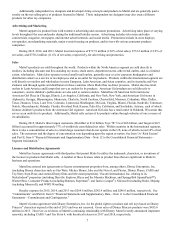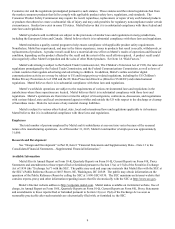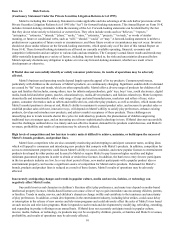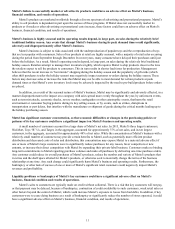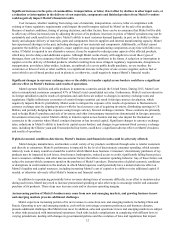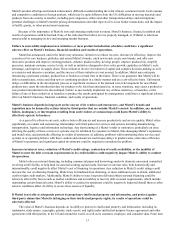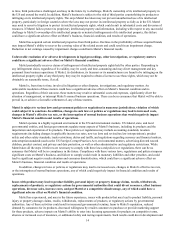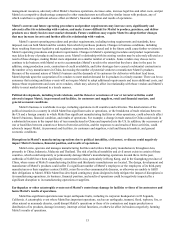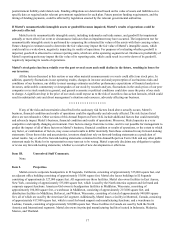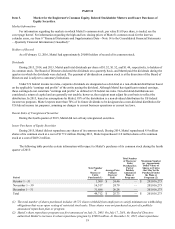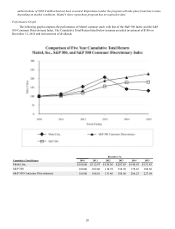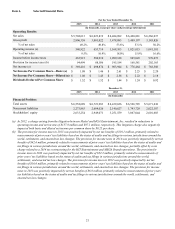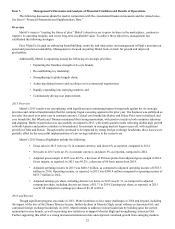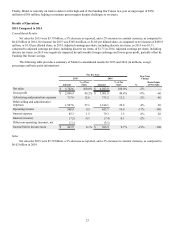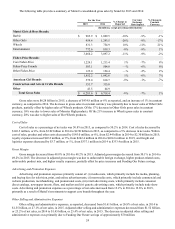Mattel 2015 Annual Report Download - page 20
Download and view the complete annual report
Please find page 20 of the 2015 Mattel annual report below. You can navigate through the pages in the report by either clicking on the pages listed below, or by using the keyword search tool below to find specific information within the annual report.16
The production and sale of private-label toys by Mattel’s retail customers may result in lower purchases of Mattel-
branded products by those retail customers.
In recent years, consumer goods companies, including those in the toy business, generally have experienced the
phenomenon of retail customers developing their own private-label products that directly compete with the products of
traditional manufacturers. Some retail chains that are customers of Mattel sell private-label toys designed, manufactured and
branded by the retailers themselves. These toys may be sold at prices lower than comparable toys sold by Mattel and may result
in lower purchases of Mattel-branded products by these retailers. In some cases, retailers who sell these private-label toys are
larger than Mattel and may have substantially more resources than Mattel.
Mattel depends on key personnel and may not be able to hire, retain, and integrate sufficient qualified personnel to
maintain and expand its business.
Mattel’s future success depends partly on the continued contribution of key executives, designers, technical, sales,
marketing, manufacturing, and administrative personnel. The loss of services of any of Mattel’s key personnel could harm
Mattel’s business. Recruiting and retaining skilled personnel is costly and highly competitive. If Mattel fails to retain, hire,
train, and integrate qualified employees and contractors, Mattel may not be able to maintain or expand its business.
Mattel may engage in acquisitions, mergers, or dispositions, which may affect the profit, revenues, profit margins, debt-
to-capital ratio, capital expenditures, or other aspects of Mattel’s business. In addition, Mattel has certain anti-takeover
provisions in its by-laws that may make it more difficult for a third party to acquire Mattel without its consent, which
may adversely affect Mattel’s stock price.
Mattel may engage in acquisitions, mergers or dispositions, which may affect the profit, revenues, profit margins, debt-to-
capital ratio, capital expenditures, or other aspects of Mattel’s business. There can be no assurance that Mattel will be able to
identify suitable acquisition targets or merger partners or that, if identified, it will be able to acquire these targets on terms
acceptable to Mattel and to potential merger partners. There can also be no assurance that Mattel will be successful in
integrating any acquired company into its overall operations, or that any such acquired company will operate profitably or will
not otherwise adversely impact Mattel’s results of operations. Further, Mattel cannot be certain that key talented individuals at
those acquired companies will continue to work for Mattel after the acquisition or that they will continue to develop popular
and profitable products or services. In addition, Mattel has certain anti-takeover provisions in its by-laws that may make it more
difficult for a third party to acquire Mattel without its consent, which may adversely affect Mattel’s stock price.
Mattel relies extensively on information technology in its operations, and any material failure, inadequacy, interruption,
or security breach of that technology could have a material adverse impact on its business.
Mattel relies extensively on information technology systems across its operations, including for management of its supply
chain, sale and delivery of its products, reporting its results of operations, collection and storage of consumer data, personal
data of customers, employees and other stakeholders, and various other processes and transactions. Many of these systems are
managed by third-party service providers. Mattel’s ability to effectively manage its business and coordinate the production,
distribution, and sale of its products depends significantly on the reliability and capacity of these systems and third-party
service providers. Mattel has exposure to similar security risks faced by other large companies that have data stored on their
information technology systems. To its knowledge, Mattel has not experienced any material breach of its cybersecurity systems.
If Mattel’s or its third-party service providers’ systems fail to operate effectively or are damaged, destroyed, or shut down, or
there are problems with transitioning to upgraded or replacement systems, or there are security breaches in these systems, any
of the above which could occur as a result of natural disasters, software or equipment failures, telecommunications failures, loss
or theft of equipment, acts of terrorism, circumvention of security systems, or other cyber-attacks, Mattel could experience
delays or decreases in product sales, and reduced efficiency of its operations. Additionally, any of these events could lead to
violations of privacy laws, loss of customers, or loss, misappropriation or corruption of confidential information, trade secrets
or data, which could expose Mattel to potential litigation, regulatory actions, sanctions or other statutory penalties, any or all of
which could adversely affect its business, and cause it to incur significant losses and remediation costs.
The level of returns on pension plan assets and the actuarial assumptions used for valuation purposes could affect
Mattel’s earnings in future periods. Changes in standards and government regulations could also affect its pension plan
expense and funding requirements.
Assumptions used in determining projected benefit obligations and the fair value of plan assets for Mattel’s pension plan
are evaluated by Mattel in consultation with outside actuaries. In the event that Mattel determines that changes are warranted in
the assumptions used, such as the discount rate, expected long term rate of return, or health care costs, its future pension benefit
expenses could increase or decrease. Due to changing market conditions or changes in the participant population, the actuarial
assumptions that Mattel uses may differ from actual results, which could have a significant impact on its pension and



